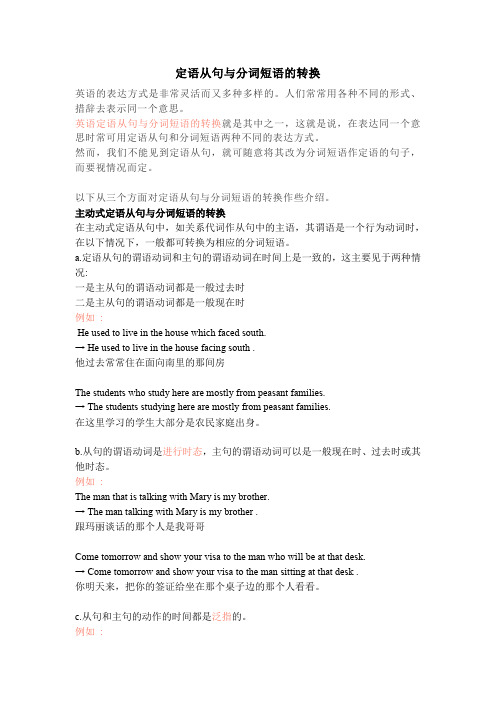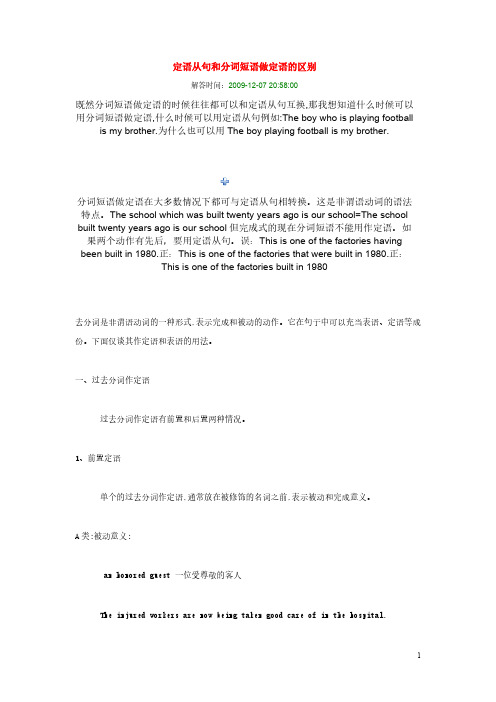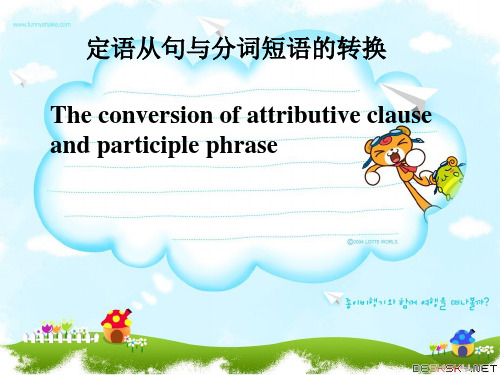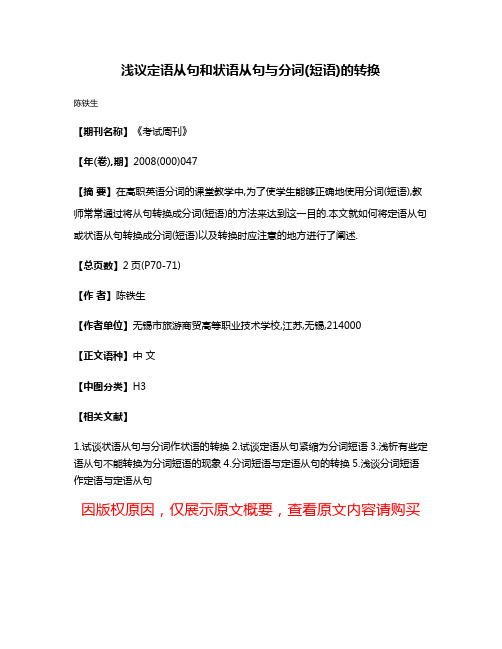分词与从句的转换
高考重难点语法-定语从句和分词短语的转化

定语从句与分词短语的转换英语的表达方式是非常灵活而又多种多样的。
人们常常用各种不同的形式、措辞去表示同一个意思。
英语定语从句与分词短语的转换就是其中之一,这就是说,在表达同一个意思时常可用定语从句和分词短语两种不同的表达方式。
然而,我们不能见到定语从句,就可随意将其改为分词短语作定语的句子,而要视情况而定。
以下从三个方面对定语从句与分词短语的转换作些介绍。
主动式定语从句与分词短语的转换在主动式定语从句中,如关系代词作从句中的主语,其谓语是一个行为动词时,在以下情况下,一般都可转换为相应的分词短语。
a.定语从句的谓语动词和主句的谓语动词在时间上是一致的,这主要见于两种情况:一是主从句的谓语动词都是一般过去时二是主从句的谓语动词都是一般现在时例如:He used to live in the house which faced south.→ He used to live in the house facing south .他过去常常住在面向南里的那间房The students who study here are mostly from peasant families.→ The students studying here are mostly from peasant families.在这里学习的学生大部分是农民家庭出身。
b.从句的谓语动词是进行时态,主句的谓语动词可以是一般现在时、过去时或其他时态。
例如:The man that is talking with Mary is my brother.→ The man talkin g with Mary is my brother .跟玛丽谈话的那个人是我哥哥Come tomorrow and show your visa to the man who will be at that desk.→ Come tomorrow and show your visa to the man sitting at that desk .你明天来,把你的签证给坐在那个桌子边的那个人看看。
分词作状语与状语从句的区别

分词作状语与状语从句的区别
分词作状语与状语从句的区别如下:
1. 结构不同:分词作状语是由动词的现在分词形式表示时间、原因、结果、条件、让步等意义,与句子主语是“逻辑上
的主谓关系”;而状语从句则由整个句子表示时间、原因、结果、条件、让步等意义,与主句是“逻辑上的主谓关系”。
2. 位置不同:分词作状语一般位于句子开头,有时也位于句子中间或结尾;而状语从句则一般位于句子开头或结尾,很
少位于句子中间。
3. 省略不同:分词作状语时,如果它所表示的动作是在句子的主语发出的,可以省略其逻辑主语;而状语从句则不能省
略其连接词。
4. 用法不同:分词作状语可以表示时间、原因、结果、条件、让步等意义,常与现在分词和过去分词连用;而状语从句
则多由连词引导,如when、if、unless、though等,也有由短
语引导的,如as if、so that等。
分词和定语从句的切换

1电在人们日常生活中得到广泛应用,因为它便于输送和转换为其它形式。
Electricity, which can be easily transmitted and changed into other forms of energy, has found wide application in daily life.Easily transmitted and changed into other forms of energy, Electricity has found wide application in our daily life.2因为在底特律可以筹集到建造机器所需的资金,所以Tom向妻子建议搬回底特律住。
Tom suggested to his wife that they move back to Detroit where he could get the necessary money to build his machine.Capable of raising fund for the construction of the machine in Detroit, Tom suggested to his wife that they move back there.3西方看到了几颗星星,小镇的灯光没能使它们暗淡。
H e could see a few stars to the west, where the lights of the town didn’t blur them out.Not blurred out by the lights of the town, stars could be seen to the west.4由于我们未能及时发货给你方造成了不便,我方表示歉意。
We apologize for the inconvenience on you that has been caused by our delay in delivery. Causing you inconvenience for the late delivery, we apologize for it.5他似乎不愿再和史密斯太太讲话,因为她现在异常无礼,令人厌烦。
分词做定语和状语与定语从句和状语从句的转换12 1

• 分词短语作定语与定语从句之间的转换 • 分词短语作状语与状语从句之间的转换
分词短语作定语与定语从句 之间的转换
• The meeting held last week is very important. • =The meeting which was held last week is very important. • 过去分词短语作定语,表被动
• Tell the boy playing there not to make loud noise. • =Tell the boy who is playing there not to make loud noise。 • 现在分词短语作定语,表主动且动作正在进行.
• 练习题:32E 1,4,6,9,12
• 主语+think/find/consider+it(形式宾语)+不 定式/宾语从句(真正宾语)
It的其他结构
• It seems that John is not coming er all.
• =John doesn’t seem to be coming after all.
• It seems +表语从句 • =表语从句主语+seem+不定式做表语
• The house standing on the corner of the street was built in 1955.
• =The house which stands on the corner of the street was built in 1955
• 现在分词短语作定语,表主动
11 醉翁亭记
1.反复朗读并背诵课文,培养文言语感。
分词与从句转换

状语从句与分词作状语的转换 一、基本规则,也是最重要的规则是:从句的主语与
主句的主语必须一致,变从句而主句不变。
They didn’t go to the Summer Palace because they had a lot of work to do.
Having a lot of work to do, they didn’t go to the Summer Palace.
四、从句是after引导的, 谓语动词是一般时态,也变 从句为完成式的现在分词短语。例如:
After she lit a candle, she went out.
Having lit a candle, she went out.
五、从句是否定句时,把从句变成否定分词短语,即 “not+分词短语”例如:
stronger. Taking exercise every day, you will get
stronger. 4.格林先生站在路边观看游行。 Mr.Green stood by the roadside and watched
the parade. Mr.Green stood by the roadside, watching
When he heard a cry for help, he rushed out Hearing a cry for help, he rushed out.
二、从句的谓语部分是“be +形容词或名词”的系表 结构时,变从句为“Being +表语”的现在分词短语 。
As he was seriously ill,he went home. Being seriously ill,he went home.
状语从句和分词作状语的转换

状语从句与分词作状语的转换时间、原因等状语从句可以转换成分词作状语,但这种转换是有条件的,也有一定的规律可循。
一、基本规则,也是最重要的规则是:从句的主语与主句的主语必须一致,变从句而主句不变。
如:They did not go to the Summer Palace because they had a lot of work to do.由于从句的主语与主句的主语都是they,可以把从句中because和they去掉,把had变成having,即成现在分词短语作原因状语:Having a lot of work to do,they did not go to the Summer Palace.二、从句如果表示主动、完成,进行的动作,则转换成现在分词;如果表示被动,则转换成过去分词。
1.When he heard a cry for help,he rushed out.从句中,he was与heard是主动关系,表示“他听见”。
则可变成现在分词作时间状语。
Hearing a cry for help,he rushed out.2.The boy Cater went up to his teacher and said“sorry”because he was great-ly touched by his words.从句中,he was touched是被动关系,是“孩子被深深地触动了”,则变成过去分词作原因状语。
Greatly touched by his teacher's words,the boy laterwent up to him and said“sorry”.三、如果从句的主语与主句的主语不一致,该怎么办?请看下例:1.As the heroes' deeds moved them deeply,they decided to study even harder.句中,主句的主语是they,而从句主语是the heroes'deeds,主语不一致,这时可以把从句变换一下句型,变成被动语态。
2024年高一英语现在分词短语转定语从句练习题30题

2024年高一英语现在分词短语转定语从句单选题30题1.The students playing basketball on the playground are from Class One.A.who play basketballB.that play basketballC.which play basketballD.whose play basketball答案:A。
现在分词短语“playing basketball on the playground”修饰students,表示正在操场上打篮球的学生。
定语从句“who play basketball on the playground”也修饰students,who 在定语从句中作主语,指人。
B 选项that 一般不用于指人。
C 选项which 用于指物。
D 选项whose 表示所属关系,不符合题意。
2.The girl singing a song in the classroom is very beautiful.A.who sings a songB.that sings a songC.which sings a songD.whose sings a song答案:A。
现在分词短语“singing a song in the classroom”修饰girl,表示在教室里唱歌的女孩。
定语从句“who sings a song in the classroom”也修饰girl,who 在定语从句中作主语,指人。
B 选项that 一般不用于指人。
C 选项which 用于指物。
D 选项whose 表示所属关系,不符合题意。
3.The books lying on the desk are mine.A.which lie on the deskB.that lie on the deskC.who lie on the deskD.whose lie on the desk答案:A。
英语短语与定语从句的相互转化

英语短语与定语从句的相互转化在英语中,有些英语短语与定语从句可以相互转化。
通过这种转化,我们可以更好地理解英语的句型。
一、介词短语与定语从旬的相互转化1) Mosrof the products (that/which are) ondisplay are very popular with the customers inEurope.展出的产品大多都受到欧洲顾客的欢迎。
2) The basket (which is) with a lot offlowersin it is for out foreign guests.装有鲜花的篮子是给我们的外国朋友的。
3) He found everything (that is) in the roomis in good order.他发现房间里的一切都井井有条。
4) Can you see the man (who is) under thetree?你能看见那个树下面的人吗?5) We should take measures on the problems(which are) aboul environment protection.我们应该采取措施解决环境保护问题。
二、动词不定式与定语从句的相互转化动词不定式的扩展与介词短语的扩展所不同的是:扩展时要注意把动词的不定式形式变为动词的谓语形式(时态要作相应变化),前面加主语构成定语从句。
例如:1) There are a lot of things to be discussed(that will be discussed) at tomon-ow's meeting.有许多事情要在明天的会议上市场论。
2) She was invited to a garden patty to be held(which was going to be held) that night. 他被邀请参加那天晚上举行的游园会。
现在分词与定语从句转换

Doing (1)【内容】(1)动名词和现在分词(2)现在分词与过去分词对比应用:状语,表语,伴随或方式,原因,条件,让步等(3)现在分词作定语时与定于从句之间的转化。
(4)现在分词作状语与状语从句的转化。
一.动名词:【定义】相当于名词,在句中作主语;宾语;表语。
【构成形式】主动:doing sth 被动:being doneHaving done having been done.【应用】1.做主语。
(1)当动词短语或动词位于句首时做主语。
被看作单数不可数名词。
主语较长时用it代替主语。
(2) 特殊句型。
It is no use doing sthIt is useless doing sthIt is no good doing sthIt is a waste of time doing sthIt is worthwhile doing sthThere is no point\ use in doing sthThere is nothing wore than doing sth 没什么比做…更糟糕的。
(3) 练习一下。
<a> 听到这个坏消息使他哭了起来。
<b> 开快车是非常危险的。
<c> 已经错过了早班车已经使她很担忧。
<d> 看那本书是浪费时间。
2.作动词宾语。
(1)Forbid doing sth; allow doing sth ,advocate doing sth ; admit doing sth ; Advise\ suggest doing sth; risk doing sth; appreciate doing sth; enjoy doing sth; Envy doing sth; avoid doing sth; consider doing sth; delay doing sth; deny doing sth. Dislike doing sth; escape doing sth; excuse doing sth; finish doing sth; forgive doing sth. Understand doing sth; give up doing sth; imagine doing sth; keep doing sth; mind doing sth. Miss doing sth , practice doing sth, put off doing sth, resist doing sth; can’t help doing sth; Can’t stand doing sth; devote to doing sth; look forward to doing sth, stick to doing sth; be used to doing sth, object to doing sth; be busy in doing sth; adapt to doing sth; be occupied in doing sth;(2)Sth need \ require\ want doing(3) allow\ permit\forbid\advice doing sth(4) 练习<a> The light in the office is still on. He forgot (turn) it off.<b> Don’t you remember (see)the man before?<c> I can’t bear (laugh).<d> you will forbid (photograph) in the park.= you will in the park.<e> Your composition needs (correct) .= Your composition needs .做介词宾语(1) 动词+ 介词+ doing sthBe used to doing ; be related to doing; get down to doing ; be given to doing =be addicted to doing ; put one’s mind to doing ; give rise to (引起); be equal to doing sth ; devote one’s to doing sth ; lead to doing sth; object to doing ; look forward to doing sth; be opposed to doing sth ; stop\ keep\ prevent sb from doingh sth; protect sb from doing sth; forbid sb from doing sth; Remind sb of doing sth ; Warn sb of doing sth ; Rob sb of doing sth; inform sb of doing sth ; accuse sb of doing sth ; feel like doing sth.(2) 形容词+ 介词+doing sthBe busy in doing ; be occupied in; be interested in ; be responsible for doing sth..(3) 主语+ have + fun\ pleasure \a good time\ trouble \ difficulty \ problem in doing sth;have no hesitation in doing sth(4) what\ how about doing sth (征求意见)(5)go + shopping\ swimming\ camping\ climbing\hiking\ running\skating\ walking\ sightseeing\dancing\ fishing\ riding\ jogging\ hunting\ driving\ boating ……练习<a> I used to (get) up late , but now I am used to (get) up early.<b> The rain prevented us from (go) out .<c> She objects to (marry) me.<d> 你对打篮球感兴趣吗?<e> 我读懂他有困难。
英语中状语从句与分词互换方法

英语中状语从句与分词互换方法例句:When they heard the news, they immediately set off for Shanghai.=Hearing the news, they immediately set off for Shanghai.在含有状语从句的主从复句中,可将状从转化为分词的形式,具体步骤如下:步骤一:去掉连词,但除特别强调外不可去或表让步转折如unless, though, although 等不可去。
(注意:before, after 从句省略时,应变为动名词结构!此处before/after 为介词。
)步骤二:看主语。
若从句主语与主句一致,可去掉从句主语;若从句主语与主句不一致,则保留从句主语(独立主格)。
步骤三:变动词。
有be 动词去掉be 动词;没be 动词,看从句中的动词与主语之间的关系,主动进行-ing,被动完成-ed。
注意:1、另有一种“连词+it is+adj.”结构中,可直接去掉it is。
如:If (it is) possible, we'll build another railroad in this area.If (it is) necessary, we should try it again.2、Being 何时去?何时留?保留大致分三种:A.表原因,逻辑主语(常)为人时,常保留。
B.“Be+普通adj./n”常保留,如cute, ill 等。
C.逻辑主语为代词或There be 结构,常保留。
D.独立主格中表“正在被…”,常保留。
去掉大致分三种:A.短语结构,常省略。
B.被动结构,常省略。
根据英语语言的从简性C.“Be+分词adj./adv.”,常省略。
D.带有强调连词后,常省略。
3、语言的从简性,即能省则省。
Eg:Being a league member, he is always helping others. 由于是共青团员,他经常帮助他人。
定语从句和分词短语做定语的区别

定语从句和分词短语做定语的区别解答时间:2009-12-07 20:58:00既然分词短语做定语的时候往往都可以和定语从句互换,那我想知道什么时候可以用分词短语做定语,什么时候可以用定语从句例如:The boy who is playing football is my brother.为什么也可以用The boy playing football is my brother.分词短语做定语在大多数情况下都可与定语从句相转换。
这是非谓语动词的语法特点。
The school which was built twenty years ago is our school=The school built twenty years ago is our school但完成式的现在分词短语不能用作定语。
如果两个动作有先后,要用定语从句。
误:This is one of the factories having been built in 1980.正:This is one of the factories that were built in 1980.正:This is one of the factories built in 1980去分词是非谓语动词的一种形式,表示完成和被动的动作。
它在句子中可以充当表语、定语等成份。
下面仅谈其作定语和表语的用法。
一、过去分词作定语过去分词作定语有前置和后置两种情况。
1、前置定语单个的过去分词作定语,通常放在被修饰的名词之前,表示被动和完成意义。
A类:被动意义:an honored guest 一位受尊敬的客人The injured workers are now being taken good care of in the hospital.受伤的工人现正在医院受到良好的照料。
B类:完成意义:a retired teacher 一位退休的教师They are cleaning the fallen leaves in the yard.他们正在打扫院子里的落叶。
定语从句与分词短语的转换

定语从句转换成现在分词短语做后置定语, 有主动或进行的意思。先行词与现在分词
有主动关系
• The boys who are playing tennis are my friends. • The boys playing tennis are my friends. • I know the boy who is running in the park. • I know the boy running in the park
用定语从句完成下列句子.
The man standing under under 1. The man is my brother. He is standing The man who is standing the tree under the tree. _____________________. is my brother the tree is my brother.
Fill in the blanks with proper participles
• 1. The scientist _________ us a talk just now is giving from Tsinghua University. (give) • 2. The teacher followed by her students came ________ in. (follow) singing • 3. The girl ________ for us at the party is Tom’s sister. • (sing) performed • 4. The play ___________ last night was written by Shakespeare. (perform) shown • 5. I love the movie ________ on TV last night. (show)
浅议定语从句和状语从句与分词(短语)的转换

浅议定语从句和状语从句与分词(短语)的转换
陈铁生
【期刊名称】《考试周刊》
【年(卷),期】2008(000)047
【摘要】在高职英语分词的课堂教学中,为了使学生能够正确地使用分词(短语),教师常常通过将从句转换成分词(短语)的方法来达到这一目的.本文就如何将定语从句或状语从句转换成分词(短语)以及转换时应注意的地方进行了阐述.
【总页数】2页(P70-71)
【作者】陈铁生
【作者单位】无锡市旅游商贸高等职业技术学校,江苏,无锡,214000
【正文语种】中文
【中图分类】H3
【相关文献】
1.试谈状语从句与分词作状语的转换
2.试谈定语从句紧缩为分词短语
3.浅析有些定语从句不能转换为分词短语的现象
4.分词短语与定语从句的转换
5.浅谈分词短语作定语与定语从句
因版权原因,仅展示原文概要,查看原文内容请购买。
高考重难点语法-定语从句和分词短语的转化

定语从句与分词短语的转换英语的表达方式是非常灵活而又多种多样的。
人们常常用各种不同的形式、措辞去表示同一个意思。
英语定语从句与分词短语的转换就是其中之一,这就是说,在表达同一个意思时常可用定语从句和分词短语两种不同的表达方式。
然而,我们不能见到定语从句,就可随意将其改为分词短语作定语的句子,而要视情况而定。
以下从三个方面对定语从句与分词短语的转换作些介绍。
主动式定语从句与分词短语的转换在主动式定语从句中,如关系代词作从句中的主语,其谓语是一个行为动词时,在以下情况下,一般都可转换为相应的分词短语。
a.定语从句的谓语动词和主句的谓语动词在时间上是一致的,这主要见于两种情况:一是主从句的谓语动词都是一般过去时二是主从句的谓语动词都是一般现在时例如:He used to live in the house which faced south.→ He used to live in the house facing south .他过去常常住在面向南里的那间房The students who study here are mostly from peasant families.→ The students studying here are mostly from peasant families.在这里学习的学生大部分是农民家庭出身。
b.从句的谓语动词是进行时态,主句的谓语动词可以是一般现在时、过去时或其他时态。
例如:The man that is talking with Mary is my brother.→ The man talking with Mary is my brother .跟玛丽谈话的那个人是我哥哥Come tomorrow and show your visa to the man who will be at that desk.→ Come tomorrow and show your visa to the man sitting at that desk .你明天来,把你的签证给坐在那个桌子边的那个人看看。
- 1、下载文档前请自行甄别文档内容的完整性,平台不提供额外的编辑、内容补充、找答案等附加服务。
- 2、"仅部分预览"的文档,不可在线预览部分如存在完整性等问题,可反馈申请退款(可完整预览的文档不适用该条件!)。
- 3、如文档侵犯您的权益,请联系客服反馈,我们会尽快为您处理(人工客服工作时间:9:00-18:30)。
分词的形式:(not ) doing现在分词的一般式(主动、进行)(not ) done过去分词的一般式(被动、完成)(not ) being done分词的进行被动式(被动、进行)(not ) having done分词的完成式(主动、完成)谓语与分词非谓语转换的一般原则do/does/didis/are doingwas/were doing--- doingis/are/was/were done--- doneis being done--- being donehas/have done--- having donehas/have been done--- (having been) done分词与从句的转换1 分词作定语,相当于定语从句1) The hospital was an old buildingthat/which was built in 1931.--- The hospital was an old building built in 1931.2) Do you know the girl who isstanding over there--- Do you know the girl standing over there3) The man who spoke to us theother day has gone to London.--- The man speaking to us the other day has gone to London.4) He became inspired when hethought about helping ordinary people who were exposed to cholera.--- He became inspired when he thought about helping ordinary people exposed to cholera.5) He found that it came from theriver which was polluted by the dirty water.--- He found that it came from the river polluted by thedirty water.6) He immediately told the peoplein Broad Street who were astonished to remove the handlefrom the pump.--- He immediately told the astonished people in BroadStreet to remove the handlefrom the pump.7) He found supporting evidencefrom two other deaths that were linked to the Broad Street outbreak.--- He found supporting evidence from two other deaths linked to the Broad Street outbreak.8) The building which is beingbuilt is a new hospital.--- The building being built isa new hospital.2.分词作状语,相当于状语从句:1) While I was waiting for the bus,I caught sight of her.--- (While) waiting for the bus,I caught sight of her.2) As he was educated by the party,he became a great fighter.--- Educated by the party, hebecame a great fighter.3) Because I hadn’t received ananswer, I wrote to him again.--- Not having received an answer, I wrote to himagain.4) If we had been given enoughtime, we could have done itbetter.--- If (having been) givenenough time, we could havedone it better5) Though he had made greatachievements, he didn’t pride.--- Though having made great achievements, he didn’tpride.2.分词作状语,相当于并列句或可以与with转换:1) He died, and left his daughtermuch money.--- He died, leaving his daughter much money.2) The teacher entered theclassroom, followed by his students.--- The teacher entered the classroom and his studentsfollowed him.The teacher entered theclassroom and he was followedby his studentsThe teacher entered theclassroom with his studentsfollowing him.3. 独立主格作状语,相当于状语从句--- The shower being over,wecontinued our journey.--- All the tickets (havingbeen) sold out,they went awaydisappointed.4. 分词做表语或宾补1) He got interested in the twotheories explaining how cholera killed people.2) He became inspired when hethought about helping ordinarypeople.3) He was frightened and his mindwas confused.4) He found that the windows werebroken.--- He found the windowsbroken.5) I found that my heart wasbeating fast at the news of bomb explosion.--- I found my heart beatingfast at the news of bombexplosion.练习:1. A man was arrested by the police. What was his name (合并成简单句)--- What was the name of the man arrested by the police2.There is a young woman who is dressed in green. (改成简单句)--- There is a young woman dressed in green.3.The concert which was given by the band was a great success. (改成简单句)--- The concert given by the band was a great success.4.What’s the language spoken in that area (改成复合句)--- What’s the language which/ that is spoken in that area5.We’ve already reached the target set in the program. (改成复合句)--- We’ve already reached the target that / which was set in the program.6.站在门口的那个人是我的爸爸。
(用分词和从句两种形式翻译)The man standing by the door is my father.The man who is standing by the door is my father.7.The pen lying on the table belongs to you. (改成复合句)--- The pen which is lying on thetable belongs to you.8.The boy making faces is my son. (改成复合句)--- The boy who is making faces is my son.9.I like songs which were sung by Liuhuan. (改成简单句)--- I like songs sung by Liuhuan.10. I found that he was waitingfor a bus at the station.(改成简单句)--- I found him waiting for abus at the station.12. If all things are considered,her paper is better thanyours. (改成简单句)--- All things considered, her paper is better than yours.Her paper is better than yours with all thingsconsidered.13. As mum is ill in bed,I can notgo to school.(改成简单句)--- Mum being ill in bed,I can't go to school.14. He went away and not a word wasspoken.(改成简单句)--- He went away without a word spoken.He went away without speaking a word.1.called2.calling3.considered4.Consideringparedparing7.Faced8.Facing9.seated10.sitting11.Having waited12.waiting13.to have studied14.to be studying15.to study16.Having finished17.being held18.to be held19.held20.Being ignored21.Being exposed22.Exposing23.absorbed24.was absorbed25.finished26.had been finished/ wasfinished27.being28.were29.to attend30.attend31.working32.dragging33.attended34.type35.(in) bringinge37.to come38.talking39.talking40.mentioned41.mentioned42.Exposed43.Exposing44.Expose45.Exposing46.Being exposed47.To make48.Getting49.Listening50.Listening。
